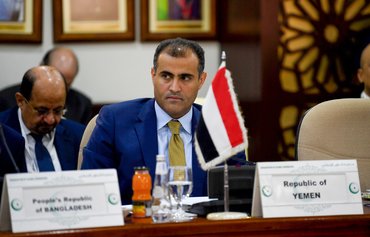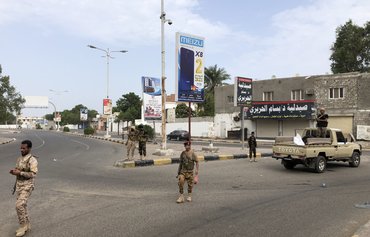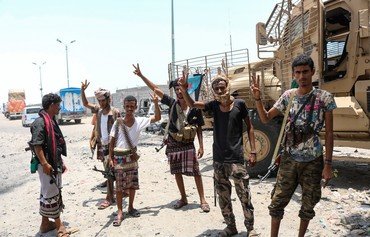Yemen's state institutions, fractured by the ongoing conflict, can only be restored by a peace agreement between the warring parties, analysts said.
As the war enters its sixth year, the Iran-backed Houthis (Ansarallah) control state institutions in Sanaa, while the internationally recognised government, backed by the Arab coalition, has set up administration in Aden.
The Houthis seized control of state institutions headquartered in Sanaa during a September 2014 coup.
Yemeni President Abd Rabbu Mansour Hadi fled to Aden, and sought outside help to restore the state. The Saudi-led Arab coalition launched Operation Resolute Storm to this end in March 2015.
![Children return home after filling their jerrycans with water amid a severe shortage of water in the southern Yemeni city of Aden, on April 30th. [Saleh al-Obeidi/AFP]](/cnmi_am/images/2020/06/30/24745-Yemen-Aden-children-600_384.jpg)
Children return home after filling their jerrycans with water amid a severe shortage of water in the southern Yemeni city of Aden, on April 30th. [Saleh al-Obeidi/AFP]
As the battle between the Yemeni government and the Houthis continues, both helped and hindered by the separatist Southern Transitional Council (STC), government agencies remain splintered and ineffective, analysts said.
This will not change until a peace agreement is reached, they told Al-Mashareq.
Split between Sanaa, Aden
"Some of the government ministers who relocated to Aden performed government functions in the name of the legitimate government," political analyst Faisal Ahmed told Al-Mashareq.
Meanwhile, the Houthis continued to run government ministries and institutions in Sanaa as a de facto authority, he said.
Five years on, the legitimate government's administrative apparatus, based in Aden, is not fully complete, as some state institutions are in the hands of the Houthis, he said.
Additionally, the ministries in Aden "are ministries by name only, and do not have real headquarters", he said, while some government officials are based outside Yemen for security and logistical reasons.
This fracturing of government institutions and agencies "has compounded the suffering of citizens in both the liberated provinces and those controlled by the Houthis", Ahmed said.
State institutions are facing numerous difficulties, both in Aden and Sanaa, as a result of the administrative disarray that has left them unable to address the Yemeni people's needs and concerns, he said.
One example is the relocation, in late 2016, of the Central Bank of Yemen from Sanaa to Aden, he said, which led to the stoppage of payment of salaries to state employees in Houthi-controlled provinces.
Only a small number of public sector employees, who moved with their families to Aden, continue to receive payment, though they face other challenges.
Fracturing of state agencies
The split of state agencies between Sanaa and Aden has negatively affected the overall situation Yemen, which was already facing record high rates of poverty and unemployment, economist Abdel Aziz Thabet told Al-Mashareq.
Government agencies controlled by the Houthis have "no legitimacy", he said, and have come to resemble "a local government operating like a municipal administration" which has failed in its duties to the people.
The legitimate government tried to replicate these institutions in Aden, he said, but was thwarted by the STC, which seized control of its headquarters and blocked ministers who opposed it from returning to Aden.
"The continuing war and persistence by both sides in operating within the government they established constitutes negligence in promoting the interests and rights of citizens and a drain on state resources," Thabet said.
It is imperative that all parties to the conflict "acquiesce to peace to restore citizens' security, dignity and rights and the country's cohesion", he said.
The Houthis' coup dragged Yemen into a war that has destroyed the economy and ripped apart its social fabric, Deputy Minister of Human Rights Nabil Abdul Hafeez told Al-Mashareq.
"We will need to build the state and rebuild state institutions in general," he said, calling on the STC not to create further obstacles through its rebellion.
"Peace is the solution, so that everyone returns to the outcomes of the National Dialogue in order to build the institutions and restore social peace and life to normal in one way or another," he added.
It is necessary to implement the power-sharing agreement signed between the government and the STC in Riyadh as soon as possible, he said, and to facilitate the return of the state and the provinces that are still under Houthi control.

![Fighters with Yemen's separatist Southern Transitional Council stand guard at the entrance of the Ministry of Finance's premises in Aden on April 26th, after the council declared self-rule in the south. [Saleh al-Obeidi/AFP]](/cnmi_am/images/2020/06/30/24774-Yemen-Aden-ministry-600_384.jpg)







Huge
Reply1 Comment(s)